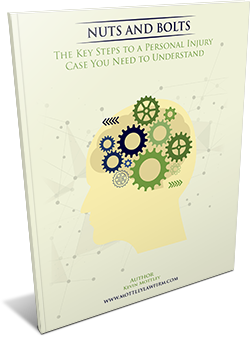How a Richmond Car Accident Attorney Can Help Your Case for Rib Injury Compensation
Collisions with other vehicles cause a wide range of injuries. Even seemingly minor car crashes may result in painful bruised or broken ribs, which often lead to both short-term and long-term losses for which victims should be fairly compensated. If you or someone you know has suffered rib injuries after a car accident, it’s essential to consult with a Virginia car accident lawyer at The Mottley Law Firm as soon as possible, as this condition profoundly impacts your daily life and long-term recovery.
Common Types of Rib Injuries From Car Accidents 
Chest and rib injuries from car accidents range in severity. Some are relatively minor and patients heal on their own in a few weeks. Others create lifelong complications if left untreated. While shoulder blades and the collarbone partly protect rigid upper ribs, flexible lower ribs are at greater risk of potential injury. Here are some of the most common problems our clients have experienced.
Bruised or Sprained Ribs
Suffering a rib injury from a head-on collision doesn’t necessarily mean the ribs are broken. The ribs may be bruised or sprained from the force of airbag deployment or the chest striking the steering wheel. While the ribs are damaged, they remain intact, but strain in the surrounding soft tissue, including cartilage and muscles, can cause tenderness, pain, swelling, and bruising.
Broken Ribs
These are the most common chest injuries in car accidents. In some cases, one or more ribs may suffer a hairline fracture, while in other cases, the ribs are fully broken, sometimes completely in half or into several pieces. Jagged rib edges can harm blood vessels and critical organs, and bone shards may cause additional damage to the surrounding tissue.
More severe rib damage occurs with a flail chest injury, which is when three or more ribs are broken in two or more places. This undermines the rib cage’s integrity, causing it to lose its regular shape. The upper rib cage may no longer mold correctly to the lungs during breathing, causing further damage to the lungs with every breath. In the most serious cases, this can cause respiratory failure.
Costochondral Separation
Each rib bone connects to the sternum, or breastbone, with cartilage. Costochondral separation refers to when the ribs separate from this cartilage. Like flail chest injury, this can compromise the integrity of the rib cage as a whole.
Intercostal Muscle Strains
Just as cartilage connects rib bones to the sternum, intercostal muscles connect the rib bones to each other. The impact from a collision can strain, pull, or tear these chest muscles. If you suffer intercostal strains, it’s common to experience chronic pain during daily activities.
Soft Tissue Injuries
Rib injuries from car accidents aren’t limited to the rib bones themselves. The body consists of an interconnected network of systems. Whether it was a side-impact collision, head-on crash, or a rear-end auto accident, victims are at risk of soft tissue injuries to the chest area.
Soft tissue injuries around the ribs cause serious pain while moving, as well as difficulty breathing. Damaged tissue isn’t as capable of allowing the ribcage to expand and contract with each breath. This leads to further complications, like infection and pneumonia.
Internal Organ Damage
They may not be immediately visible, but internal injuries can be among the most brutal injuries suffered following a car accident. Fractured ribs damage internal organs the rib cage is meant to protect, including the heart and lungs. Unfortunately, you might suffer from both acute trauma and long-term issues such as:
- Collapsed lung
- Damage to the aorta or coronary artery
- Heart and liver problems
- Ruptured spleen
- Damage to blood vessels
Serious damage to these vital organs can prove fatal, including death from the loss of blood.




